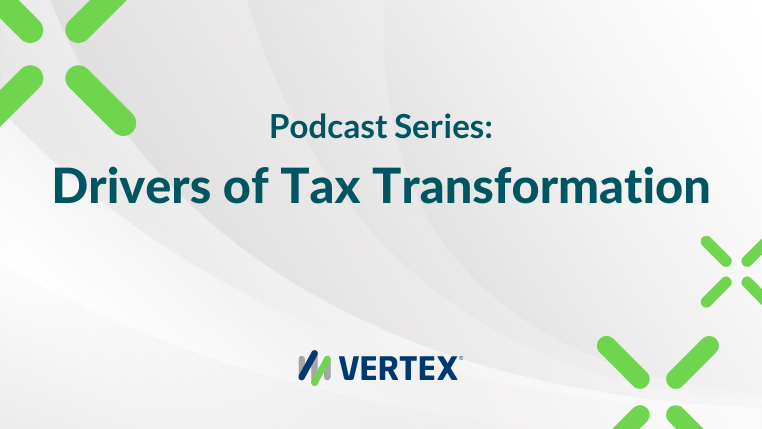Steve Johnston: Welcome to Tax Matters, a Vertex podcast! I’m Steve Johnston, Product Marketing Manager at Vertex.
Rapidly changing business models. Expanding compliance footprints. Digital taxation. The Great Resignation. These issues represent only a fraction of the urgencies bearing down on tax groups and their corporate finance partners.
In this episode of our series on tax transformation, Kevin Permenter, IDC’s Research Director for Financial Applications -- discusses what’s keeping CFOs and tax leaders awake at night.
After highlighting the most prevalent challenges, Kevin discusses why CFOs view automation as a crucial solution to many of these problems. Kevin also talks about how automation driven by intelligence can help tax groups.
Now, I’ll turn it over to moderator, Eric Krell, and Kevin Permenter…
Eric: Kevin, let’s focus in on the challenges confronting tax groups and finance functions. What are the sources of their most notable issues and what are some key implications of these challenges?
Kevin: Some of the sources of these issues are the same things that are, impacting every walk of business, right? The idea of rapidly changing business models. We’re starting to see organisations introduce physical goods as well as digital goods and services, and that’s changing the tax landscape. India, in particular, even into some places in the EU have really been sort of on top of their game when it comes to trying to make sure to include [guidance] writing and available information around how they’re going to tax digital goods and services. And regulations will change from country to country and also from year to year, and item to item, right? If you start thinking about that level of complexity, then that definitely is one of the huge issues that tax managers face as they try to maintain compliance in a hyperdynamic world.
Today, it is probably “not fast enough” when it comes to getting answers to key questions like “Are we in compliance?” and “What’s our compliance footprint?” It used to be that, some of those questions could wait till the end of the period. Now, even if I have to wait until the end of the day, it might not be fast enough. In the case of point of sale, for example, speed is of the essence right down to fractions of a second. You have to be able to get that customer the right information when it comes to their tax burden on a particular transaction. You don’t want to hold up the transaction because you didn’t, accurately display this bit of information on the tax forms around the invoice or because the invoice wasn’t formatted properly.
Eric: Those are substantial compliance-related challenges. Tax and finance groups face other challenges. I’m thinking about what seems to be a long-term labor crunch. What are some of the implications of that skills gap on the tax and finance functions?
Kevin: We’re seeing this, of course. They’re calling it the great resignation. The idea is that a lot of skills are being lost because companies are experiencing quitting and resignations at a high level. And I’ll tell you, at the core accounting area -- staff accountant, tax accountant, audit, and similar roles -- there’s been a tremendous amount of brain drain. And there hasn’t been a lot of replacements. If you look at U.S., or example, and the number of students that are majoring in accounting; that’s gone down over the last five years. Not only are you experiencing a drain now, but in many ways there’s no help coming either. The answer, of course, is, “OK, let’s automate. Let’s utilise technology as a bridge so that we can kind of do more with less.” here’s a little bit of a crisis happening on the people side of tax. And again, this is a place where they’re going to rely on vendors to kind of to step in there to provide easy-to-use software, easy-to-learn software to provide education and training. They’re going to be leaning on the tax software vendor and tax experts for that kind of thing.
Eric: As CFOS and also tax leaders consider these investments in automation, in part driven by the need to do more with less, what should they know about technology trends and some of the ways that these solutions have changed in recent years?
Kevin: The [software] companies that have been really investing in their solution … these companies have re-architected, rebuilt the platform, the foundation of the software. How you’ll be able to see that is that you’ll be able to interact with your tax solution and your tax solution will be able to easily interact and bring data to you from the sales platform, maybe the CRM platform and the expense management platform. All these other business software platforms that exist inside of a business’s ecosystem, the new wave of tax software will be able to easily plug into that and deliver that information -- whatever relevant information that’s needed to get a complete tax profile or taxability profile is going to be available, again, because of the work that these companies have put in to build out their infrastructure.
And then the real key is that there’s going to be a ton of automation driven by intelligence, right? There’s going to be places where, for example, filing or the tax calculation, tax content, product classification – these are all places where tomorrow’s tax technology will augment the user with machine learning and AI and those sorts of things.
Eric: Kevin, last question on this topic…Given the talent challenges that you describe, and also some of the automation progress that you described, are you seeing any differences in terms of what tax groups choose to manage internally vs. what they might choose to outsource?
Kevin: I’m seeing less of a desire to outsource in mass, to outsource the entirety of a process. And more of a sense that, yes, this is a huge data problem and we don’t have a ton of resources to do it, but with the aid of advanced technology, the aid of advanced software, now this is information that I can have readily available to me and it’s information that is becoming more core. You can make an argument that the tax information plays a role in the budgeting and planning aspects. It plays a role in the customer experience, customer satisfaction aspects and as such, it’s not something that I can simply wait until the end of the period and then get a report from a service provider. We’re seeing organisations feeling more confident about the huge data management problem that is tax compliance. As such, they’re keeping more of it and willing to do more of it in-house as opposed to outsourcing quite a bit of it.
Eric: Well, Kevin, some formidable challenges, but also some really exciting and innovative solutions. Thanks very much.
Kevin: You’re welcome.
Steve Johnston: Thanks for listening to Tax Matters and our series on tax transformation.
This transcript has been edited for clarity.


